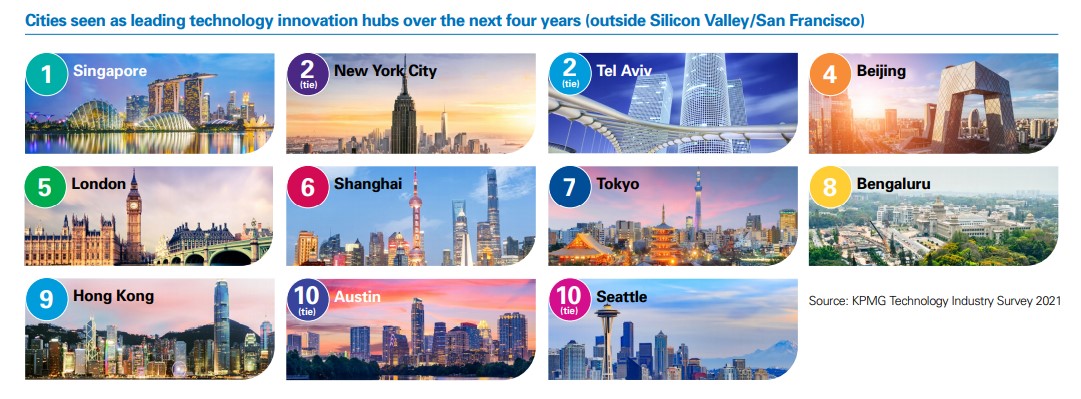Six cities in the Asia-Pacific region are among the top ten cities expected to flourish as technology innovation hubs in the next four years, results of a new survey show. Among the cities outside of Silicon Valley in California, Singapore ranked first for the second year running, besting New York City and Tel Aviv, which tied for the second spot, and London which ranked fifth.
Other Asia-Pacific cities in the top ten are Beijing, fourth; Shanghai, sixth; Tokyo, seventh; Bengaluru, eighth; and Hong Kong, ninth. Completing the top ten are Austin and Seattle of the United States, which tied for the tenth place, according to the 2021 edition of the KPMG Technology Industry Survey, now in its ninth year. Seoul, ranked eighth last year, dropped out of the top ten to tie for 14th place this year.

The survey covered more than 800 global executives in the technology industry across 12 countries.
Darren Yong, KPMG’s Asia-Pacific head of TMT, says: “We are seeing Asia take a leading position in innovation across the world and as highlighted in this report, more than 50% of these top innovation hubs are based in this region. Asian cities will continue to be a hotbed of creativity and we expect even more activity as organizations invested in Asia look to further disrupt business models to capture the world’s largest consumer population.”
When asked which countries and jurisdictions show the most promise for developing disruptive technologies, global tech leaders identified the United States, China and India as the top three, the same as in last year’s survey. Local factors influence a city’s status as a technology hub, including infrastructure, university community, demographics and tax incentives. Macro factors such as regulatory environments, available investment funding, and potential national tax incentives can help position a country as an incubator of technology innovation.
The cities making the top 10 all had strong ecosystems in place before the Covid-19 pandemic, enabling them to emerge stronger and potentially provide a real challenge to Silicon Valley, as the world prepares for a post-Covid recovery, according to the report.
“The success of the technology sector has outpaced most other industries during Covid-19, with many companies growing significantly since the start of the pandemic,” says Daniel Chan, partner, national lead for the TMT sector at KPMG China. “This has advanced the perception that creativity and innovation can now happen literally anywhere as collaboration has gone more virtual and more global.”
Anson Bailey, partner, head of TMT, Hong Kong, adds: “Within China, companies and industry players expect the clustering effect of the Greater Bay Area to grow at a faster rate than the rest of mainland China, especially in the fields of technology and innovation, financial services and trade and logistics. Corporates are expected to capitalize on Hong Kong’s position as a regional hub, with talent development a key driver along with the growing R&D investment across GBA and the rest of mainland China.”
Physical sites
While many global tech leaders are implementing hybrid or remote workforce models to retain top talent, global tech leaders also believe physical innovation hubs are necessary and important and remain a key component of their strategy.
Almost twice as many global tech executives (39%) believe that physical hub locations are still important in driving technology innovation, versus those who believe they are not (22%). These findings are consistent across all the subsectors of the technology industry. Even among the respondents that feel neutral or that physical hubs are not important, 92% think that physical hubs will still exist four years from now.
Chief executive officers of tech companies corroborate the importance of physical locations and in-person employee interaction. In the KPMG 2021 CEO Outlook Pulse Survey, 78% say they will not be downsizing their physical footprint. Only 26% expect to hire predominantly remote talent, while 58% think the majority of employees will work remotely two to three days per week, indicating an appetite to still have workers on site for part of the workweek.









